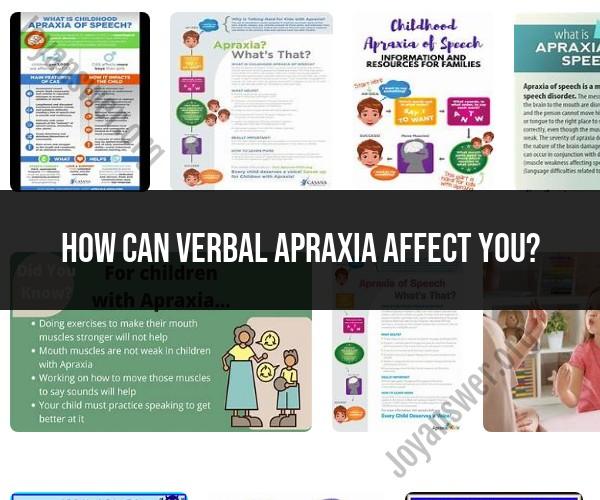How can verbal apraxia affect you?
Verbal apraxia, also known as apraxia of speech (AOS), can have a significant impact on an individual's communication abilities and daily life. The effects and challenges associated with verbal apraxia may vary from person to person, but here are some common ways in which it can affect individuals:
Speech Sound Errors: One of the hallmark characteristics of AOS is the presence of speech sound errors. People with AOS may have difficulty pronouncing speech sounds correctly and consistently. This can lead to misarticulations, substitutions, omissions, and distortions of speech sounds, making their speech difficult for others to understand.
Effortful Speech: Speaking for individuals with AOS can be effortful and slow. They often need to put a lot of conscious effort into planning and coordinating the movements of their speech articulators (tongue, lips, jaw) to produce speech sounds accurately. This can result in a slower rate of speech.
Inconsistent Speech: AOS is characterized by inconsistent speech sound errors. This means that the same word or sound may be pronounced differently each time it is produced, making it challenging for both the individual with AOS and their communication partners to predict and understand their speech.
Difficulty with Complex Speech Tasks: People with AOS may struggle with more complex speech tasks, such as speaking in longer sentences, articulating multi-syllable words, or producing speech sounds in rapid succession, as in natural conversation.
Frustration and Communication Breakdowns: AOS can be frustrating for individuals because they often know what they want to say, but they have difficulty expressing it clearly. This frustration can lead to communication breakdowns and social isolation.
Impact on Social Interaction: Verbal apraxia can affect social interactions. People with AOS may become self-conscious about their speech difficulties and may avoid speaking in social situations, leading to reduced social engagement and potential feelings of isolation.
Challenges in Education and Work: Children with AOS may face challenges in educational settings, including difficulty with phonics, reading, and writing. Adults with AOS may find it challenging to participate in meetings, interviews, or jobs that require clear verbal communication.
Treatment Needs: Verbal apraxia typically requires speech-language therapy by a qualified speech-language pathologist. Therapy focuses on improving speech sound production, increasing speech intelligibility, and developing compensatory strategies for effective communication.
Progress and Improvement: With appropriate therapy and support, many individuals with AOS can make significant progress in their speech abilities. Early intervention is often key to achieving the best outcomes.
It's important to note that verbal apraxia does not affect intelligence or overall cognitive abilities. People with AOS often have intact language comprehension and cognitive skills. The severity of AOS can vary, and not all individuals with AOS will experience the same level of difficulty. Individualized assessment and therapy are essential to address specific needs and challenges associated with verbal apraxia.
Impact of Verbal Apraxia: How It Can Affect Communication
Verbal apraxia is a motor speech disorder that affects a person's ability to coordinate the muscles used for speech. Children with verbal apraxia know what they want to say, but they have difficulty saying it correctly.
Verbal apraxia can have a significant impact on communication. Children with verbal apraxia may have difficulty:
- Producing speech sounds correctly
- Imitating speech
- Producing complex words and phrases
- Speaking fluently
- Speaking with intonation
This can make it difficult for children to communicate with their peers and teachers, and it can lead to frustration and social isolation.
Verbal apraxia can also affect a child's academic achievement. Children with verbal apraxia may have difficulty reading and writing, and they may have difficulty participating in class discussions.
Living with Verbal Apraxia: Navigating the Challenges and Solutions
There is no cure for verbal apraxia, but there are treatments that can help children to improve their speech. Treatment typically involves speech therapy, which can help children to learn how to coordinate the muscles used for speech.
With early diagnosis and treatment, most children with verbal apraxia can learn to speak clearly and fluently. However, some children may continue to have difficulty speaking, even with treatment.
There are a number of things that parents and teachers can do to help children with verbal apraxia communicate effectively. Some tips include:
- Be patient and understanding. It takes time and effort to improve speech with verbal apraxia.
- Provide children with opportunities to communicate in different ways. For example, children can use gestures, pictures, or writing to communicate.
- Use augmentative and alternative communication (AAC) devices, if needed. AAC devices can help children to communicate even if they have difficulty speaking.
- Create a supportive and encouraging environment. Children with verbal apraxia need to feel comfortable communicating, even if they make mistakes.
Speech Difficulties: A Closer Look at the Effects of Verbal Apraxia
Verbal apraxia can affect speech in a variety of ways. Some of the most common speech difficulties associated with verbal apraxia include:
- Articulation errors: People with verbal apraxia may have difficulty producing speech sounds correctly. For example, they may say "w" instead of "r" or "f" instead of "s."
- Prosody errors: People with verbal apraxia may have difficulty with the rhythm, intonation, and stress of speech. This can make their speech sound monotonous or choppy.
- Fluency problems: People with verbal apraxia may have difficulty speaking smoothly and fluently. They may hesitate, repeat words or sounds, or have long pauses between words.
The severity of speech difficulties associated with verbal apraxia can vary from person to person. Some people with verbal apraxia have mild speech difficulties, while others have severe speech difficulties that make it difficult for them to be understood.
Conclusion
Verbal apraxia is a complex speech disorder that can have a significant impact on communication. However, with early diagnosis and treatment, most children with verbal apraxia can learn to communicate effectively. Parents and teachers can play an important role in supporting children with verbal apraxia by being patient and understanding, providing opportunities for communication, and creating a supportive and encouraging environment.












